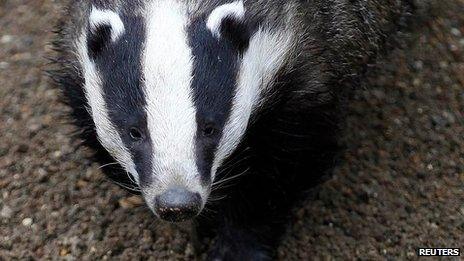Advice on badger cull extension challenged
- Published

Both pilot badger culls have been extended
England's chief vet has rejected accusations his advice to ministers on the badger cull risked bringing the veterinary profession into disrepute.
In official advice, Nigel Gibbens said extending the culling period would help to achieve the earliest and greatest possible impact on bovine TB.
But vets have questioned the grounds for the extension, saying it risked spreading TB to badgers and cattle.
Mr Gibbens said his advice was well founded and he would not retract it.
On Wednesday, Natural England granted a controversial eight-week extension to the badger cull in Gloucestershire, more than a week after a three-week extension in Somerset.
It followed the failure in both areas to shoot the planned target of 70% of the badger population over six weeks.
Central to granting an extension to the cull was advice from the chief vet, Nigel Gibbens.
In his official guidance, Nigel Gibbens said: "If the number of badgers culled is short of the target reduction, leaving a high badger population in the area, the benefit of reducing the disease risk to cattle from that badger population by extending the period of culling to reduce the badger population is likely to outweigh the perturbation impact of leaving a high badger population."
However, 10 members of the Royal College of Veterinary Surgeons questioned this advice in a letter seen by the BBC.
They wrote: "We are concerned that the advice you are giving in relation to the results of the pilot badger culls and their extension could result in increased suffering of badgers, and place both badgers and cattle in and around the cull zones at greater risk of contracting bovine tuberculosis.
"The advice is also being issued before the independent expert panel, convened to examine the results of the pilot culls, has had any opportunity to study those results and deliver its opinion."
Devastating disease
Mark Jones, one of the signatories of the letter, who is also executive director of Humane Society International, told the BBC: "As a group of vets we think that in issuing the advice he has the chief vet is not taking full account of the independent scientific evidence available to him and in not doing so he is not only potentially condemning more badgers but also potentially putting cattle and therefore farmers at greater risk from the impact of bovine TB."
But Nigel Gibbens rejected the allegations and said he would not retract his advice to the secretary of state.
In a letter seen by the BBC, he wrote: "The disease control rationale in my advice is well founded and there is nothing in your letter to refute it.
"I am neither acting irresponsibly nor risking bringing the profession into disrepute and you are wrong to make this assertion.
"Finally I can assure you that the government will await the conclusions of the independent expert panel before making any decisions on the wider roll out of culling as part of a comprehensive strategy for the control of bovine tuberculosis."
Ministers and the NFU say culling badgers will curb TB in cattle, but protesters say it has little effect.
A Defra spokesperson said: "The clear advice of the chief veterinary officer is that the more badgers removed in the first year of the cull, the greater and quicker reductions in the cull area will be.
"Bovine TB is a devastating disease for our dairy and cattle farmers and we must do everything we can to stop its spread."
- Published27 August 2013
- Published23 October 2013
- Published18 October 2013